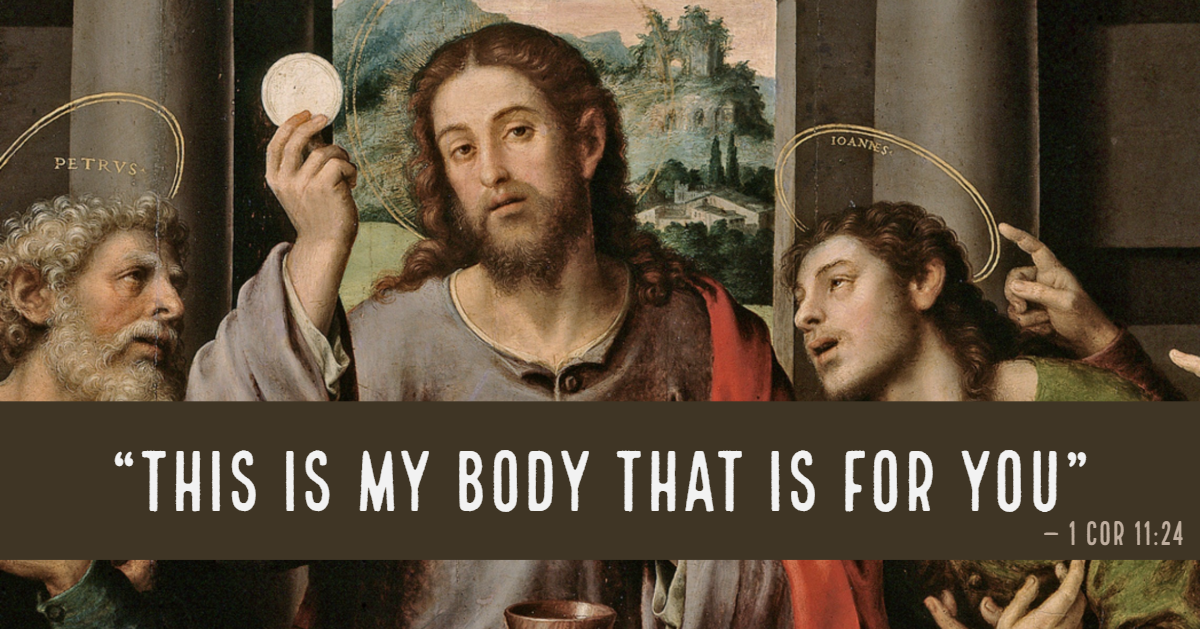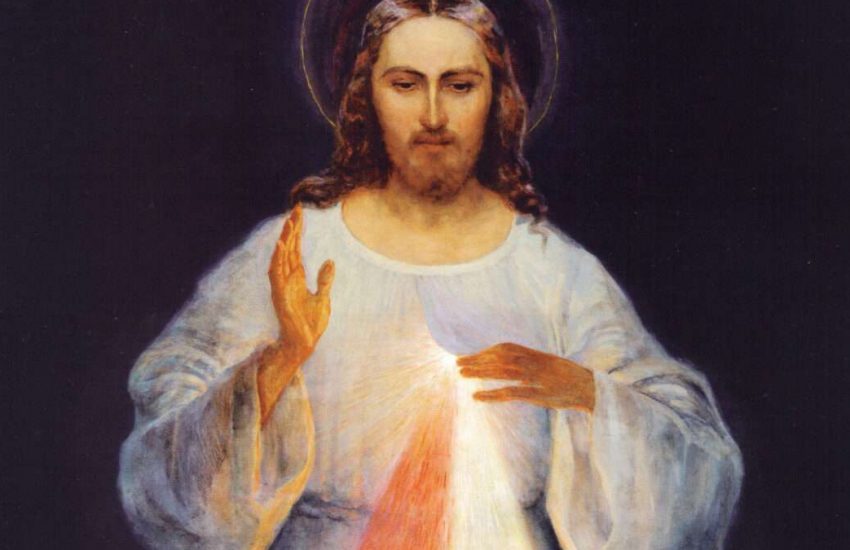The Nuptial Meaning of the Eucharist
The Solemnity of the Most Holy Body and Blood of Christ (Corpus Christi)
- Lectionary Readings from the USCCB
NOTE: I am spending the week before the Feast of Corpus Christi attending the Steubenville Conference for Priests, Deacons and Seminarians at Franciscan University. The following is the text of a homily I preached for Corpus Christi last year, exploring the relationship between the Eucharist, the sacrament of Christ’s Body, and Marriage, the sacrament that is native to our bodies. If you’d rather listen to it than read it, you can find an audio file here. I pray that it blesses you. — Deacon Matt
“Do you have a personal relationship with Jesus Christ?”
If you are like many Catholics, you may have tensed up a bit at that question. It calls to mind the stereotypical Protestant evangelist, telling you that you need to “accept Jesus Christ as your personal Lord and savior.” When we Catholics are challenged by Protestants about our personal relationship with Jesus we tend to get a little defensive. We bristle. We tend to view our relationship with Christ as something corporate, rather than personal. Ours is not a religion practiced in solitude. We belong to the Church, and our relationship with Jesus is lived in and through the Church. The suggestion that we need to have a personal relationship with Jesus sounds suspiciously Protestant to us.
This is unfortunate. Because the greatest thing the Catholic Church has to offer is a very personal, and indeed intimate relationship with Jesus Christ.
I want to share a story that was told to me by a Dominican Friar. Before he entered religious life, he used to live in an apartment that was within walking distance of the local Catholic Church. So he walked every day to daily Mass.
One day he was confronted by a street preacher, who asked him, “Do you have a personal relationship with Jesus Christ?” He had just gotten out of Mass and he put his hands on the street preacher’s shoulders, looked him square in the eye, and with a big smile on his face said, “Jesus kisses me on the lips every day!” I don’t think the street preacher was expecting that answer.
Jesus kisses me on the lips every day. What a beautiful way to express the tender intimacy that Christ offers each one of us in the Eucharist. We, as Catholics, believe that the bread and wine offered at Mass, through the prayers of the priest, become the Body and Blood, Soul and Divinity of our Lord. We’ve read this in the Catechism. We know this in our minds. But has it sunk in to our hearts? Do we ever pause to think about just how intimate an act our reception of Holy Communion truly is, when we receive Christ’s Body into our own?
Recently I was preparing a man to enter into full communion with the Church. We were talking about the Eucharist and I pointed out to him that as a baptized Christian, he was part of the Body of Christ. And when he received the Eucharist, he would be receiving the Body of Christ. Which meant that Christ’s body would be inside him, while he was inside of Christ’s Body. And I asked him, “Does that sound like anything else to you?”
I was thinking of the Blessed Trinity, which we had discussed before, with the three Divine Persons all living within one another, in perfect union. But he said something else. Without hesitation, he said, “Marriage.” And he wasn’t wrong. Because, or course, Christian marriage is an image of the Trinity.
And marriage is also a wonderful image to help us understand the Eucharist. First, like any marital relationship, it requires trust. A husband and wife must have faith in one another, and so we must have faith in Jesus. Any time you are challenged by a Protestant about the Catholic belief in the Real Presence of the Eucharist, there is only one answer you need to give. “Jesus said, This is my body, and I trust him.” There is no other reason to believe in the Eucharist.
But trust between spouses must be mutual. And so the Eucharist also requires Jesus to trust in us. Think about it. God comes to us in a form that is utterly helpless. We talk about the humility expressed in the Incarnation, when the Word of God became a baby who needed to nurse in the arms of his Blessed Mother. He entrusted himself to Mary in a most special way. And now he does the same each time the Eucharist is celebrated. He places himself entirely in our hands. Whether we adore him or ignore him is up to us. The Word that became flesh gives us his flesh to eat.
Why? Why does God make himself something as helpless and vulnerable as food? I asked my eight year old daughter that question, who received her first Holy Communion last month. And she told me, without hesitation, “So he can be close to us.” From the mouths of babes.
Indeed God longs to be close to us. And not just close like the person sitting in the pew next to you is close. God wants to be so close that he dwells within us, and we dwell within him, with the same intimacy as that shared by the Three Persons of the Trinity. Jesus says, “I am in the Father and you are in me and I am in you” (Jn 14:20).
Brothers and sisters in Christ, there are only two examples of human relationships that are so close that one person dwells within another: marriage and motherhood. It is this level of closeness — a Trinitarian closeness — that God desires to have with you and I.
Jesus dwelt within the body of his mother, Mary, for nine months in her womb, and now he wants to dwell within your body, by taking you as his bride. Yes, gentlemen, even you, too.
The Church is the Bride of Christ. Yes, the Church is also the Body of Christ, but this is really another way of saying the same thing. Jesus Christ has taken the Church as his bride, and the two have become one flesh, so his Bride has become his Body. He is the husband of the bride and the head of the body. Read Ephesians chapter 5. Everything Paul writes about marriage — the husband being head of his wife and loving her as he loves his own body — Paul says, “This is a profound mystery; I am talking about Christ and the Church” (Eph 5:32).
The Mass is our wedding banquet! In the Eucharist, Christ’s body joins with ours, and we become one flesh with God. When you approach the altar, do you understand that you are approaching you wedding chamber? When you receive Holy Communion, do you understand that you are a bride receiving her groom?
If we want to understand the Church’s disciplines around the reception of Holy Communion, we need to stop thinking of Communion as a sort of mark of membership in a religious club, and start thinking about it as our marital embrace with God.
That requires faithfulness. Husbands and wives, if you were estranged from your spouse would you dare demand marital intimacy without first being reconciled? Of course not. So if we are estranged from God by mortal sin, how dare we demand intimacy with him without first being reconciled in confession?
Sometimes the Catholic Church is criticised for not having open communion. We are accused of being exclusive. Well of course the Eucharist is exclusive, for the same reason that marriage is exclusive! If your non-Catholic friends want to know why they can’t receive Holy Communion, it is because they are not part of the Bride. Before they can receive Christ’s flesh into their bodies, they must become “one flesh” with him in the Church.
And finally, our Communion with Jesus, like marriage, should be open to life. Brothers and sisters, are we guilty of receiving the Body of Christ with a contraceptive mentality? Do we place barriers between ourselves and our Lord, that prevent his seed from being planted in our hearts, and bearing fruit?
Jesus gives everything to us. He withholds nothing. He gives us his sacred Body, his precious Blood, his human Soul, and his godly Divinity. He comes to us gently, in a way we can receive, every day if we so desire. Simple bread, simple wine. He takes on a form that we can see and touch, smell and taste. And he says, “Take this. This is my body.” I am yours. Such sweet love our Lord has for us.
How dare we withhold anything from our groom, who performs such miracles to be with us? How dare we tell our Lord, you can have all of me except for this one part?
If there is any part of your life that you have held back from Christ, give it to him now. If it involves mortal sin, make a solemn commitment to go to confession as soon you can, to be reconciled with your Divine Spouse. If it is venial sin, give that over to God now, in prayer. Tell him to take your weakness, and heal it, transform it with his love. He can do this. He longs to do this. He has become bone of your bones and flesh of your flesh, and has given you his flesh for your salvation. You are so very precious to him.
He just needs you, his beloved bride, to allow him into the inner chambers of your heart. He is a gentle and respectful lover. And so he won’t go there unless you invite him in. He has complete and utter respect for your person.
So if you tell the Bridegroom, “no, you can’t have this part of me, it’s too personal,” he will respect that. He will keep his distance. But is that what you want? Or do you want instead that intimate personal relationship with Jesus Christ that he offers? Let our communion with Jesus in the Eucharist be so complete, that when we are asked about our relationship with Jesus, we too may say with joy, “My Lord kisses me on the lips every day!”



